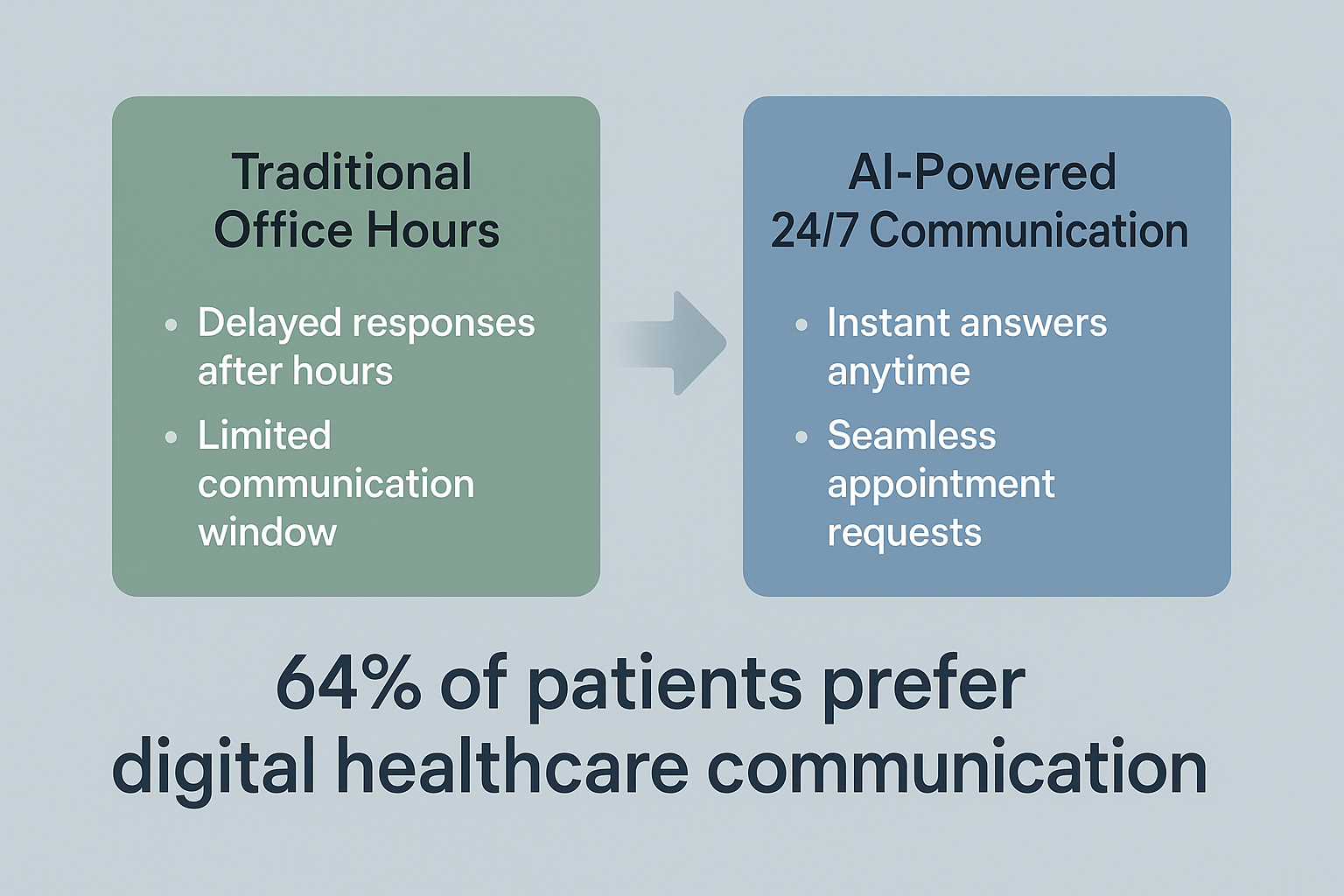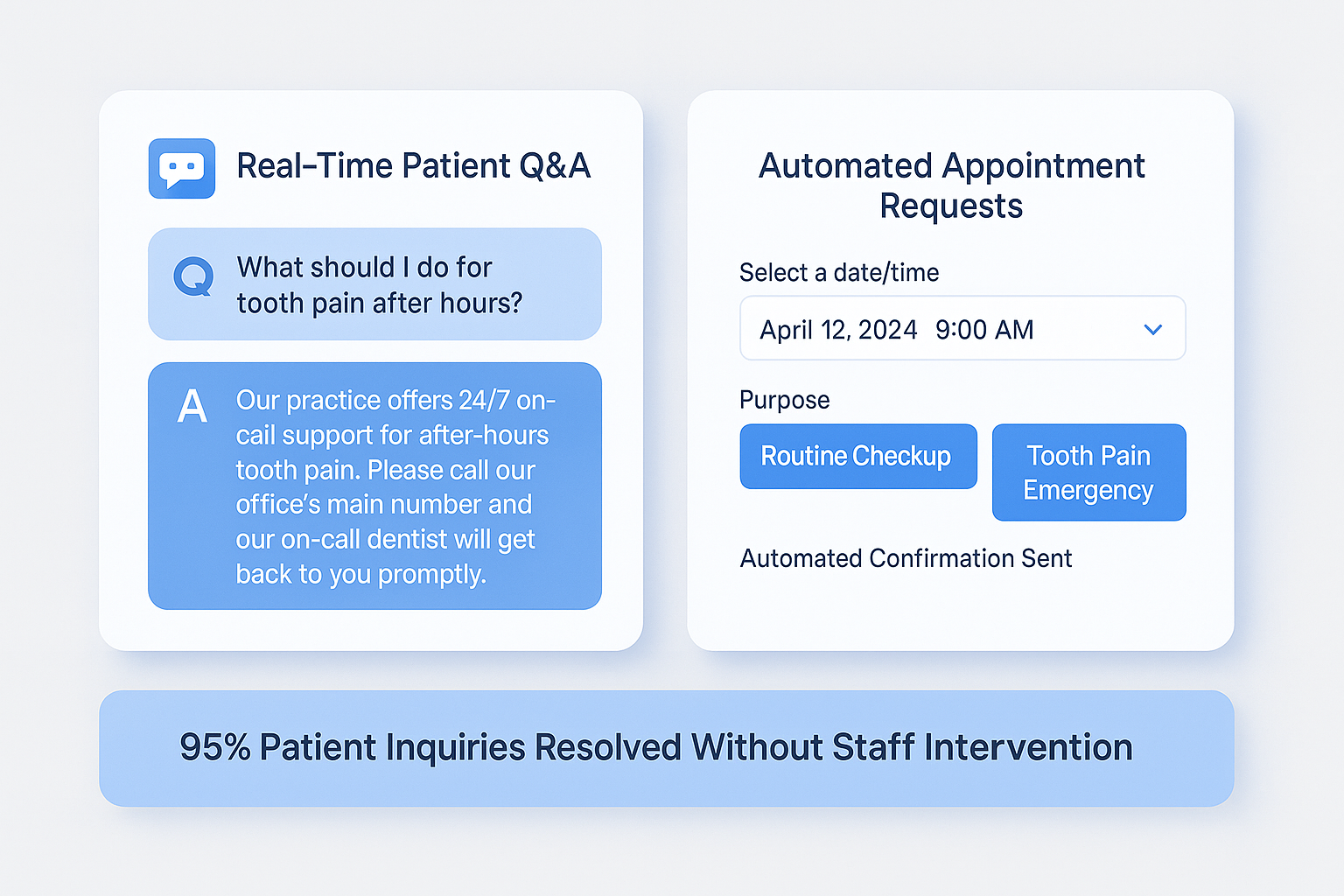Dental emergencies don’t clock out at 5 PM, but your staff shouldn’t have to be on call 24/7 either. Managing after-hours patient inquiries can lead to burnout and frustration for both dental teams and patients seeking urgent care. The OnCall Bot offers a solution, providing round-the-clock automated support to handle common dental queries and appointment requests, allowing your practice to cut down on late-night calls while still delivering responsive patient care.
Table of Contents
The Rise of AI in Dental Patient Communication
Did you know that 64% of patients prefer digital communication with healthcare providers? This trend is reshaping how dental practices interact with their patients, especially outside of regular office hours.

AI-powered chatbots are quickly becoming the go-to solution for many healthcare providers, including dentists. These virtual assistants offer several key benefits:
- 24/7 availability for patient inquiries
- Instant responses to common questions
- Reduced workload for office staff
- Improved patient satisfaction
As patients increasingly expect quick, convenient access to information, dental practices are turning to AI to meet these demands. Let’s look at some key factors driving this shift:
- Patient preferences for digital communication
- The need to reduce after-hours phone calls
- Desire for improved operational efficiency
One study found that implementing AI chatbots can lead to a significant reduction in no-show rates. Research shows that automated appointment reminders and easy rescheduling options can decrease missed appointments by up to 30%.
| Metric | Before AI Chatbot | After AI Chatbot |
|---|---|---|
| No-show rate | 20% | 14% |
| After-hours calls handled | 10% | 80% |
| Patient satisfaction | 70% | 85% |
As more dental practices adopt AI-powered communication tools, patients are enjoying quicker responses and easier access to care. This technology is helping dentists provide better service while also streamlining their operations. The OnCall Bot, for example, offers 24/7 support to handle patient inquiries and appointment requests, freeing up staff time for more complex tasks.
With the growing demand for instant, round-the-clock support, AI chatbots are becoming an essential tool for modern dental practices looking to enhance patient care and operational efficiency.
How Automated Bots Handle Common Dental Queries
Dental practices get a lot of the same questions over and over. It can be tiring for staff to answer them all day (and night). That’s where AI bots come in handy. They can take care of the basics, giving your team a break.
Here are some common things an AI bot can handle:
- Booking appointments – Patients can pick a time that works for them
- Rescheduling – No need to play phone tag
- Post-procedure care – Reminders about what to do after treatment
- Emergency guidance – Help figuring out if something needs immediate attention
The cool thing is, bots can do this 24/7. So even if your office is closed, patients can still get help. It’s like having a super-smart assistant who never sleeps.
But bots aren’t just for patients. They can make life easier for your staff too. For example, The OnCall Bot creates detailed notes of every chat. This means your team can quickly catch up on what happened overnight without having to listen to a bunch of voicemails.
Implementing an AI Dental Support Bot
Adding an AI bot to your practice isn’t as hard as you might think. Here’s a simple process to get started:
- Pick the right bot for your needs
- Set it up with your practice info
- Train your staff on how to use it
- Let your patients know it’s available
- Keep an eye on how it’s doing and make tweaks
When choosing a bot, look for one that’s made for dental practices. Generic customer service bots might not know the difference between a crown and a cavity.
Here are some things to consider when setting up your bot:
- What questions do you get asked most often?
- What’s your office’s “voice” – formal, friendly, somewhere in between?
- What info do you need to collect from patients?
Remember, a bot is there to help, not replace your team. It’s about making things smoother for everyone.
Impact on Practice Efficiency and Patient Satisfaction
So, what happens when you add an AI bot to your practice? Let’s break it down:
| Before Bot | After Bot |
|---|---|
| Staff answering calls at all hours | Bot handles after-hours queries |
| Patients waiting on hold | Instant responses 24/7 |
| Missed appointment opportunities | Easy booking anytime |
The big win is that your team can focus on the work that really needs a human touch. No more spending hours on the phone answering the same questions over and over.
Patients love it too. They can get help when they need it, even if it’s 2 AM. This kind of service can turn a one-time visitor into a loyal patient.
And here’s something interesting: practices using bots often see more appointments booked. Why? Because people can schedule when it’s convenient for them, not just during office hours.
But don’t just take my word for it. A recent study found that dental practices using AI for admin tasks saw a 30% reduction in workload. That’s a lot of time saved.
Of course, every practice is different. The key is to find a bot that fits your specific needs. For example, The OnCall Bot is built just for dental offices. It knows the lingo and can handle the unique questions that come with dental care.
In the end, it’s about finding the right balance. A good bot can handle the routine stuff, freeing up your team to focus on what matters most – providing great care to your patients.

The Future of AI in Dental Practice Management
AI-powered dental support bots are changing how practices handle after-hours patient care. These tools offer major benefits for both patients and staff:
- 24/7 availability for patient questions
- Reduced workload for front desk staff
- Improved patient satisfaction and engagement
- More efficient appointment scheduling
As AI technology advances, we’ll likely see even more sophisticated capabilities emerge. Here are some exciting possibilities on the horizon:
- Seamless integration with practice management software
- Advanced natural language processing for complex patient queries
- Predictive analytics to improve patient care and practice growth
These developments could revolutionize dental office operations. Imagine a system that not only handles basic inquiries but also:
| Feature | Benefit |
|---|---|
| Personalized treatment reminders | Improved patient compliance |
| AI-powered treatment planning | More efficient use of dentist time |
| Automated insurance verification | Reduced administrative burden |
While the potential is exciting, it’s important to choose AI solutions carefully. Look for tools designed specifically for dental practices, like The OnCall Bot. These specialized systems understand the unique needs of dental offices and patients.
Ultimately, the goal of AI in dentistry isn’t to replace human interaction. It’s to enhance it by freeing up staff time and providing better service to patients. As this article on AI receptionists points out, practices that embrace these tools often see significant improvements in efficiency and patient satisfaction.
The key is finding the right balance between automation and personalized care. With thoughtful implementation, AI support bots can help dental practices cut after-hours calls while still maintaining that crucial human touch.
Wrap-up
Dealing with after-hours calls can be a real headache for dental practices. But there’s good news – AI support bots are changing the game. These smart assistants can handle patient questions and appointment requests 24/7, giving your staff a much-needed break.
By using an AI bot like The OnCall Bot, dental offices can keep patients happy without burning out their team. It’s a win-win that helps practices run smoother and stay competitive. Plus, detailed conversation records make follow-ups a breeze.
As the dental world keeps evolving, embracing tech like this just makes sense. Patients get quick answers anytime, and practices can focus on what really matters – providing great care. Curious about how it all works? Check out our features page for the full scoop. And if you’ve got questions, don’t worry – we’ve got answers coming up next.
Common Questions About Dental AI Support Bots
How much does a dental AI bot cost?
Dental AI bots are more affordable than you might think. For example, The OnCall Bot offers a simple pricing model with a one-time setup fee of $495 and a monthly fee of $49.99. This covers unlimited patient interactions, making it cost-effective for practices of all sizes.
Is patient data secure with AI bots?
Absolutely. Reputable dental AI bots are designed with HIPAA compliance in mind. They use encryption and secure data handling practices to protect patient information. Always check with the provider about their specific security measures.
Can I customize the bot for my practice?
Yes, most dental AI bots offer customization options. You can usually tailor the bot’s responses, add specific information about your practice, and set up custom workflows. This ensures the bot aligns with your unique practice needs and communication style.
How do AI bots handle complex patient inquiries?
AI bots are great at handling routine questions and tasks. For more complex inquiries, they’re typically programmed to escalate to human staff. This ensures patients always get the right level of care while still reducing the overall workload on your team.
Will an AI bot really reduce after-hours calls?
Many practices see a significant reduction in after-hours calls after implementing an AI bot. By providing 24/7 support for common questions and appointment requests, bots can handle many inquiries that would otherwise turn into phone calls. This leads to fewer interruptions for staff and better service for patients.
How long does it take to set up a dental AI bot?
Setup time can vary, but it’s often quicker than you’d expect. With solutions like The OnCall Bot, many practices are up and running within a few days. The process typically involves some initial configuration and training, but it’s designed to be straightforward and minimally disruptive to your existing workflows.

No responses yet